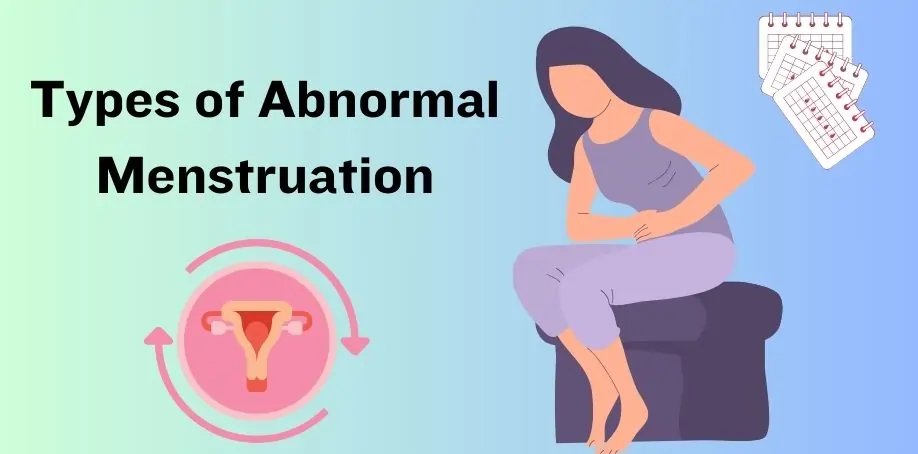Exploring 8 Types Abnormal Menstruation
Menstruation is a natural and vital part of a woman's reproductive health, but sometimes it can deviate from the typical monthly cycle. Abnormal menstruation can be a sign of underlying health issues, and understanding the various types is crucial for early detection and appropriate management. In this blog, we'll delve into eight types of abnormal menstruation to shed light on potential causes and encourage women to prioritize their reproductive health.

Dr Disha Sridhar
I am a Gynaecologist Obstetrician ( MD, DNB OBGYN) with an emphasis on INTEGRATIVE MEDICINE.
 Amenorrhea:
Amenorrhea:
Amenorrhea refers to the absence of menstrual periods, and it can be classified into primary and secondary amenorrhea. Primary amenorrhea occurs when a woman has not experienced her first period by the age of 16, while secondary amenorrhea involves the sudden cessation of periods in a woman who has previously menstruated regularly.
Menorrhagia:
Menorrhagia, characterized by prolonged and heavy menstrual bleeding exceeding seven days, poses challenges for women managing their daily activities. The risk of anemia amplifies over time, underscoring the importance of identifying and addressing the root causes, which may range from hormonal imbalances to uterine abnormalities.
Oligomenorrhea:
Oligomenorrhea, manifesting as infrequent menstrual periods with cycles longer than 35 days, introduces challenges related to irregular ovulation, particularly for women aiming to conceive. This type of abnormal menstruation underscores the need for a comprehensive fertility assessment and potential intervention.
Metrorrhagia:
Metrorrhagia, characterized by irregular and unpredictable bleeding between menstrual periods, acts as a red flag for various reproductive health issues. Hormonal imbalances or uterine abnormalities may underlie this abnormal bleeding, necessitating a detailed diagnosis for tailored treatment.
Dysmenorrhea:
Dysmenorrhea is characterized by severe menstrual cramps impacting daily life, goes beyond the normal discomfort associated with menstruation. Persistent and intense pain may signify underlying conditions such as endometriosis or pelvic inflammatory disease, requiring prompt medical attention and management.
Hypomenorrhea:
Hypomenorrhea, the opposite of menorrhagia, manifests as abnormally light menstrual bleeding. Women experiencing hypomenorrhea may face challenges associated with hormonal imbalances, prompting the need for investigation and potential intervention to restore menstrual regularity.
Polymenorrhea:
Polymenorrhea, characterized by frequent menstrual periods lasting less than 21 days, hints at hormonal imbalances or conditions affecting the ovaries. Understanding the root cause is crucial for effective management and the restoration of a more typical menstrual cycle.
Anovulation:
Anovulation, where a woman's ovaries fail to release an egg during the menstrual cycle, disrupts regular menstruation and poses challenges for those trying to conceive. Identifying and addressing the factors contributing to anovulation are pivotal for optimizing fertility.
Abnormal menstruation is crucial for maintaining reproductive health. Women experiencing irregularities in their menstrual cycles should consult with a healthcare professional to identify underlying causes and explore appropriate treatment options. Regular gynecological check-ups, maintaining a healthy lifestyle, and addressing concerns promptly can contribute to overall reproductive well-being.
Some Causes of Irregular Periods Include
Irregular periods can result from various factors, and identifying the underlying cause is essential for proper management. Here are some common causes of irregular menstrual cycles:
Hormonal Imbalances:
- Polycystic Ovary Syndrome (PCOS): A common condition where hormonal imbalances, particularly elevated levels of androgens, can disrupt the normal ovulation process.
- Thyroid Disorders: Hypothyroidism or hyperthyroidism can affect the production of hormones essential for regulating the menstrual cycle.
Stress and Lifestyle Factors:
- Chronic Stress: Elevated stress levels can impact hormonal balance, potentially leading to irregular periods.
- Extreme Exercise: Intense physical activity or excessive exercise can affect hormonal levels and disrupt the menstrual cycle.
- Significant Weight Changes: Rapid weight loss or gain can impact hormonal regulation and contribute to irregular periods.
Medical Conditions:
- Endometriosis: A condition where tissue similar to the lining of the uterus grows outside the uterus, causing pain and irregular bleeding.
- Pelvic Inflammatory Disease (PID): Infections affecting the reproductive organs can lead to inflammation and irregular menstrual cycles.
- Uterine Fibroids: Uterine Fibroids is a Noncancerous growths in the uterus that can cause heavy or prolonged menstrual bleeding.
Contraceptives and Medications:
- Birth Control Pills: Changes in hormonal birth control methods can temporarily affect menstrual regularity.
- Certain Medications: Some medications, such as anticoagulants or antipsychotics, may impact the menstrual cycle.
Perimenopause:
- As women approach menopause, typically in their late 40s or early 50s, hormonal fluctuations can lead to irregular periods before menstruation ceases altogether.
Eating Disorders:
- Conditions such as anorexia nervosa or bulimia can lead to hormonal imbalances, affecting the menstrual cycle.
Breastfeeding:
- While breastfeeding, some women may experience irregular periods due to the suppression of ovulation caused by elevated levels of the hormone prolactin.
Medical Treatments:
- Chemotherapy and Radiation: Cancer treatments can disrupt the normal functioning of the ovaries and lead to irregular periods.
It's important to note that occasional irregularities in the menstrual cycle are normal, especially during adolescence and perimenopause. However, persistent or severe irregularities warrant consultation with a healthcare professional to identify the specific cause and determine an appropriate course of action. Regular gynecological check-ups, maintaining a healthy lifestyle, and addressing any concerns promptly can contribute to menstrual health.
Originally published Dec 13, 2023
